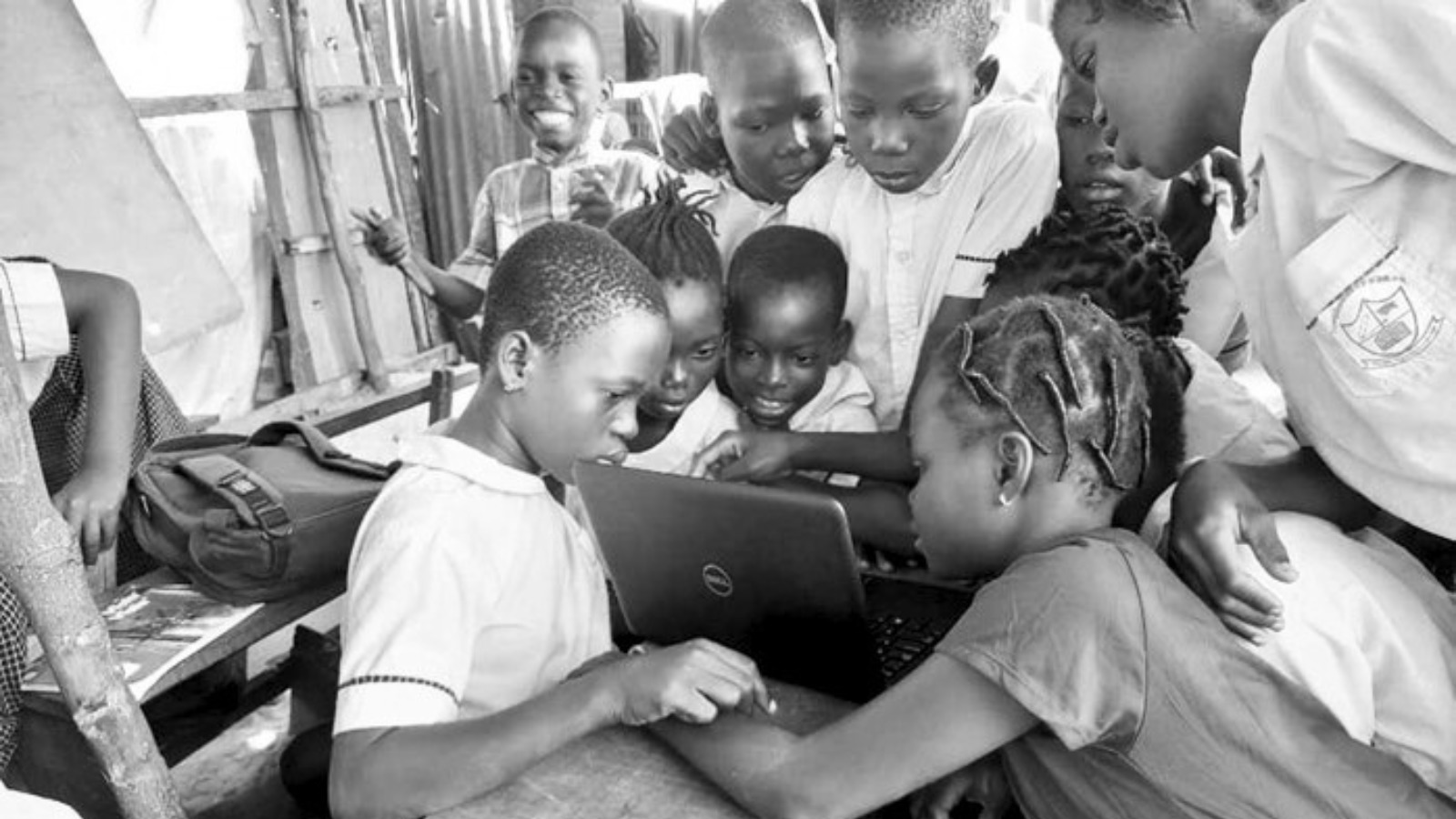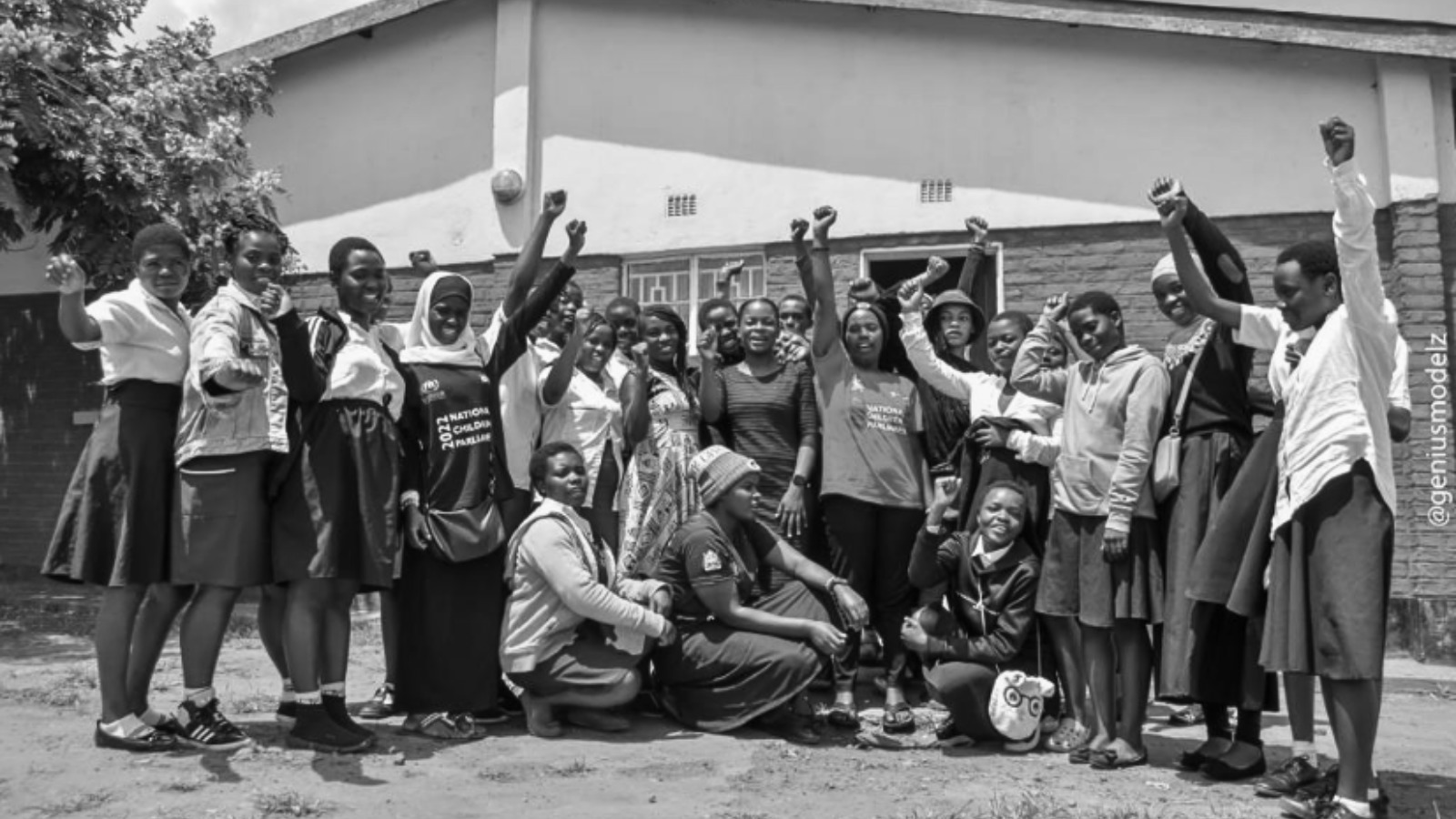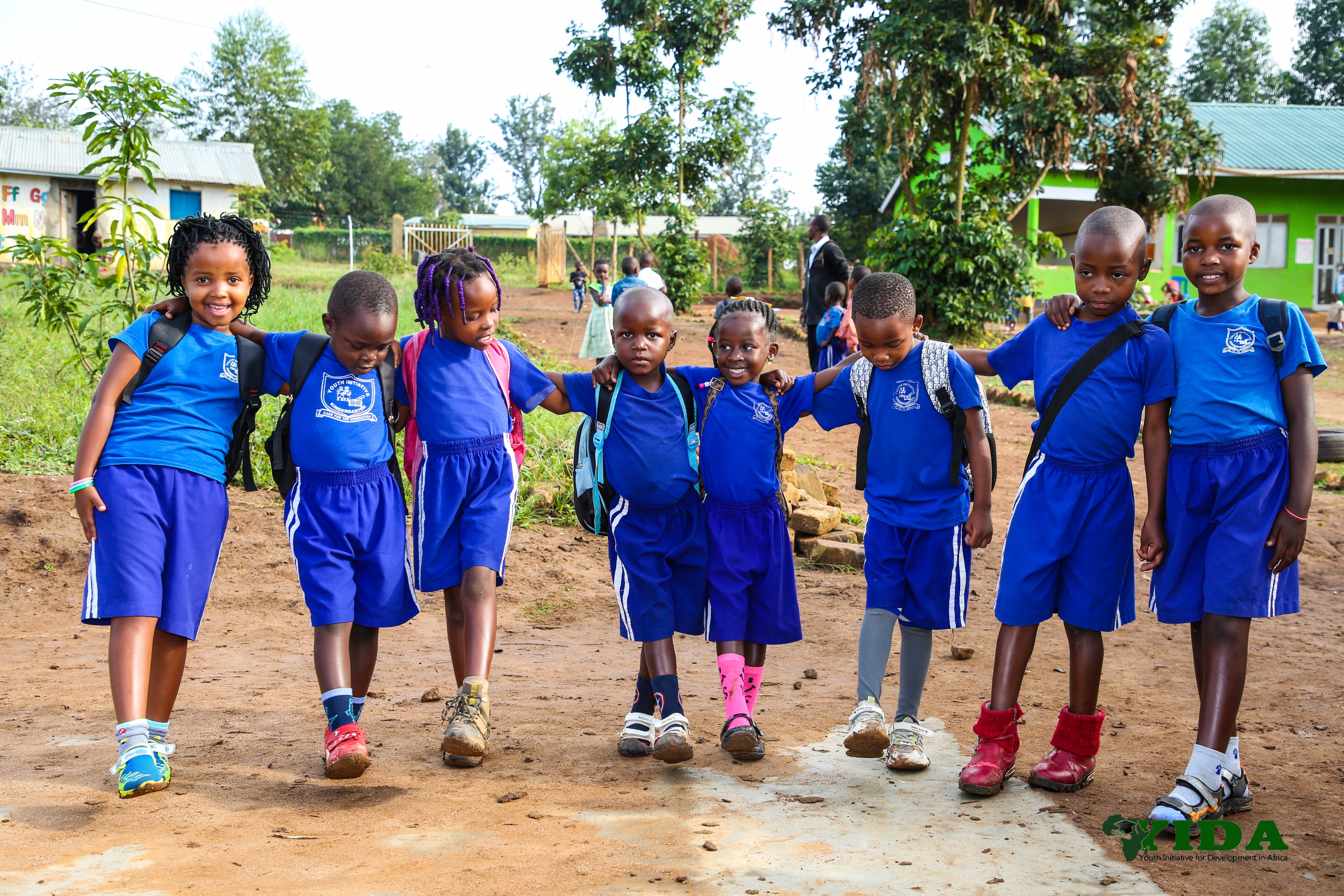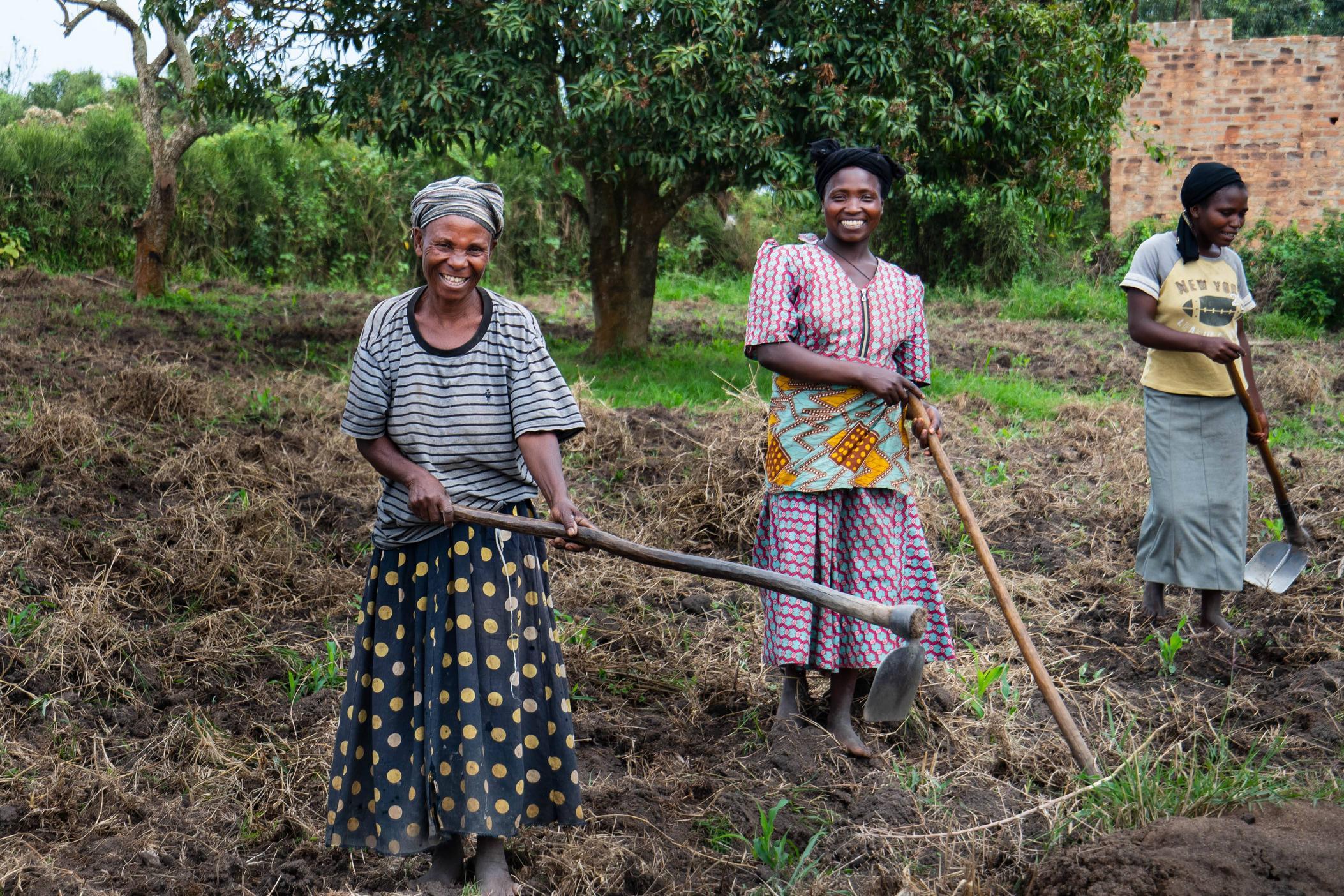
Andias and Angela - both refugees in Kenya - team up to discuss the importance of localised mentorship for girls.
By McCreadie Andias, Communications Manager, Nawezaa
This story is part of the co-branded story series, 'Rewriting the Narrative: Stories of & from Refugee and Community-Led Initiatives' a collaborative effort between Samuel Hall, Youth Voices Community, Cohere, and Reframe Initiative. Members of various Refugee-Led Organisations (RLOs) participating in the Reframe Initiative underwent an introductory training in storytelling and advocacy. They were then invited to share their personal narratives, capturing their journey, work, and the lasting impact of their initiatives. This collaboration aims not only to spotlight their incredible work but also to empower them with the skills to share their own stories effectively, fostering greater support, funding, and opportunities for their vital work.
This story highlights one RLO’s work in Nairobi on mentorship - Samuel Hall seeks to elevate their voice and connect them to those who can support them in amplifying their social impact.
Twenty years ago, Angela Jean left her home in the Democratic Republic of Congo (DRC) as a baby - with no understanding of her sudden transition or what destiny awaited hert.
Her father had gone ahead to Kenya in 2003, striving to find a safe place for his family amidst the escalating civil unrest in the DRC, which, according to UNHCR, had compelled nearly 1 million people to flee their homes in search of safety.
When they reunited in Kenya, life was challenging, with obstacles such as renting and adapting to the new surroundings. Even the Congolese accent felt like a burden.
"Congolese have that accent that, when they speak Swahili, you immediately know they don't belong here." For Angela, who lives with her parents at Kabiria, a small village in Nairobi, this accent was like a ticket to estrangement.
However, life began to find a semblance of normalcy when she enrolled at Ngong Forest Primary School in Nairobi. She started her education hoping to reshape the future of her family and community.
Angela recalls that at Ngong Forest Primary School, where she and her brother were students, nobody knew of their refugee status at first. Her peers and even the teachers treated her just like any other Kenyan student simply because they were unaware of her background.
"Everything changed in class six when my dad visited our school for the first time. That visit revealed to my teachers and classmates that we were not Kenyans," Angela shared.
Angela and her brother faced challenges. Their academic success sparked jealousy among some classmates, who felt overshadowed. "They seemed to think we had come to outdo them," Angela observed.
She recalls a particularly difficult day in class six during a lesson on creation. "The teacher asked us to divide into groups based on our tribes. I was the only refugee in the class and found myself alone."
Returning home in tears, Angela confided in her sister, "I don't want to return to that school. I don't feel like I belong there. I want to go home,” she said, questioning if being a refugee was a crime.
This incident deeply affected Angela, leading to depression and impacting her remaining time at primary school. When the Kenya Certificate of Primary Education (KCPE) exams approached, an unexpected hurdle arose. Although the KCPE exams, marking the transition from primary to high school, are typically free for every pupil regardless of tribe or origin, Angela was asked to bring 800 shillings to sit for the exams because of her refugee status.
When Angela inquired about this charge, the head teacher bluntly asked, "Did I ask you to become a refugee?" Angela feels that this remark made her fail her exams.
Despite her challenges, a still bright and determined Angela eventually progressed to high school, aspiring to become a doctor. Throughout her high school journey, Angela attended three different schools. The first two provided relief, as they had many refugee students from Somalia, Ethiopia, and Burundi. This environment made her feel more secure, surrounded by individuals with whom she shared similar backgrounds and stories.
"It has been tough being a refugee, it made me into a liar"
Angela's experience at her third high school was particularly challenging, especially during business classes. "How is the Congolese currency?" her teacher would jokingly ask another Congolese student, sparking laughter and mockery in the classroom.
Interestingly, most students and teachers at this school were unaware of her refugee status. They assumed she was from the Kikuyu tribe of Kenya, as she spoke the language fluently, having spent 19 years in the country.
However, Angela still felt deep sadness and empathy when her fellow Congolese were ridiculed in class.
To cope with this environment, Angela found herself concealing her true nationality."I used to tell my classmates that I'm Tanzanian. I had to hide my origin," she reveals.
After completing high school, Angela joined Refushe, an organisation dedicated to empowering refugee girls. This period of her life was particularly challenging, as she was the sole provider of her family. "My dad was working as a senior pastor at an ACK church. He had a stark choice: work under a Kenyan or resign. Feeling disgraced, he left the job.”
Angela, already burdened by failed relationships and family struggles, found herself grappling with deep depression. She felt like an empty shell, struggling to find something to hold onto.
"I felt like nobody wanted me or my family," she expressed.
The combined weight of her father losing his job, her family's dire situation, and her own experiences of alienation drove her to a point where she contemplated ending her life. With pills in hand, ready to give up, she paused to consider the impact on her family: "What would my parents think of me? Would this solve our problems?"
It was her strong relationship with her father that proved pivotal. Turning to him in her despair, he offered perspective and support. "Life has been tough since Congo," he reminded her.
Her father then shared that her mother had suffered five miscarriages while they were fleeing the civil war in the DRC. This insight into her family's resilience in adversity was sobering.
"One day, we will fight for our country, and we won't have to be called refugees anymore," her father encouraged her. Yet, Angela couldn't help but wonder when that day would come.
An (Unsustainable) Opportunity
At that time, the International Rescue Committee (IRC) was offering startup funding for businesses run by refugees. Angela, who had previously believed that refugees were solely dependent on aid, eagerly seized this opportunity.
Although, her initial application was rejected, weeks later, she was recalled by the IRC and granted Ksh 56,000 for her business startup.
Angela used Ksh 30,000 of this funding to pay off her father's debts. She also realised she had to change her plans: local government regulations prevented refugees from obtaining business permits, barring her from running a business freely.
With the remaining Ksh 26,000, Angela ventured into an online business, shipping clothes abroad. This endeavour ultimately failed due to insufficient capital for stocking inventory, bringing her family's financial situation back to square one.
Angela addresses a common misconception within the host community: the belief that refugees are financially well-off. She explains how the local population often assumes that refugees have substantial funds, believing they receive significant financial support from the UNHCR and other organisations.
Moreover, she points out that refugees often face even more significant challenges, as they typically lack formal and sustainable sources of livelihood, making their financial struggles more pronounced.
On the contrary, Angela believes that refugees living in urban areas are not receiving adequate support from the UNHCR, feeling that the focus is disproportionately on those in refugee camps. She asserts that this leaves urban refugees feeling abandoned and segregated.
Dwindling Hopes for the Future
When asked if there is real hope for her future, Angela can't help but feel a tinge of sadness. This stems from her perception of limited prospects for growth and achieving her dreams. Angela contemplates that if an opportunity to work abroad and support her family doesn't materialise, she might consider marrying a Kenyan.
But why a Kenyan, specifically? Angela's reasoning is deeply rooted in cultural dynamics. She understands that in many African cultures, the children of a mixed-tribe couple are typically identified with the father's tribe. Therefore, Angela hopes to secure a Kenyan nationality for her future children by marrying a Kenyan citizen. This, she believes, would spare them from the rejection, mockery, exclusion, and abuse she endured due to her refugee status and her mother's origins.
Angela's story resonates with thousands of other refugee girls who have endured similar hardships.. They often lack mentorship to overcome stigma and depression, and require guidance to handle the heavy and early responsibilities thrust upon them.
Nawezaa - Localising Support Through Mentorship
Nawezaa is a youth-led refugee organisation established in Dagoretti, Nairobi. A Swahili word that means 'I Can,' Nawezaa inspires youths to believe in the possibility of achieving their dreams.
Established in 2020, Nawezaa is actively involved in various activities, including providing Sexual Reproductive Health training to empower refugee youths, writing and publishing inspiring stories about their experiences, and conducting media interviews to raise awareness about refugee projects. Additionally, Nawezaa offers sports mentorship through the 'Refugee United in Sports (RUIS)' Programme and engages in advocacy work to support and represent refugee interests effectively.
It runs with a mission to give a voice to refugees and share their stories while empowering, guiding, supporting, and mentoring girls like Angela. Nawezaa's mentorship program is tailored to the needs of girls who have experienced the hardships of displacement. It addresses their needs through support and awareness for menstrual health, pad drive initiatives, and girl-talk sessions. These efforts aim to support, encourage, mentor, and guide young girls, helping them find hope, survival, and growth amidst their challenges.
One of Nawezaa's initiatives, the sexual reproductive health training titled 'She-world', was conducted in April this year. It equipped participants, including Angela, with skills, ideas, and knowledge to address issues faced by refugee girls, often neglected due to barriers in local systems.
The three-day training impacted 300 girls with experiences of forced displacement. It covered a range of topics, including business startups, relationship and sexuality guidance, managing issues like early pregnancies and miscarriages, menstrual education, self-awareness, combating stigma in schools, and coping with home challenges.
Angela shares that she gained invaluable experience from Nawezaa's She-world project. She had previously conflated contraceptives with family planning but now understands their differences. Reflecting on her mother's five miscarriages, she believes that increased awareness and knowledge of sexual and reproductive health could help reduce or prevent such incidents.
Such support could mean Angela and others wouldn't feel resigned to marriage as their sole path to identity, survival, or mental well-being. Rather than viewing marriage to a citizen as the only option, mentorship can provide alternative avenues for empowerment and self-realisation.
Initiatives like Nawezaa's can equip girls with the knowledge and tools to tackle their challenges and those affecting their families. However, Nawezaa faces operational and funding obstacles. The organisation lacks a formal office setup, limiting engagements with potential partners, and is missing a primary funding source to secure their activities over the long term
To fulfill the potential of Nawezaa, we are searching for partners to provide us with digital equipment such as laptops for writing and editing stories, podcast equipment for shows, capacity-building training to enhance staff expertise, partnerships for media engagements and projects, and funding to establish and maintain office space.
As an organisation, we are committed to making the Angelas of the world feel loved, protected, cared for, and supported. This approach nurtures their individual growth and contributes to a more inclusive and empathetic society.





